Viola Davis, Andra Day, and Black ladies continue to sing the Oscar blues
In the last of this seven-part series, a little bit of history repeating, a controversial Best Actress year, and looking to the future.
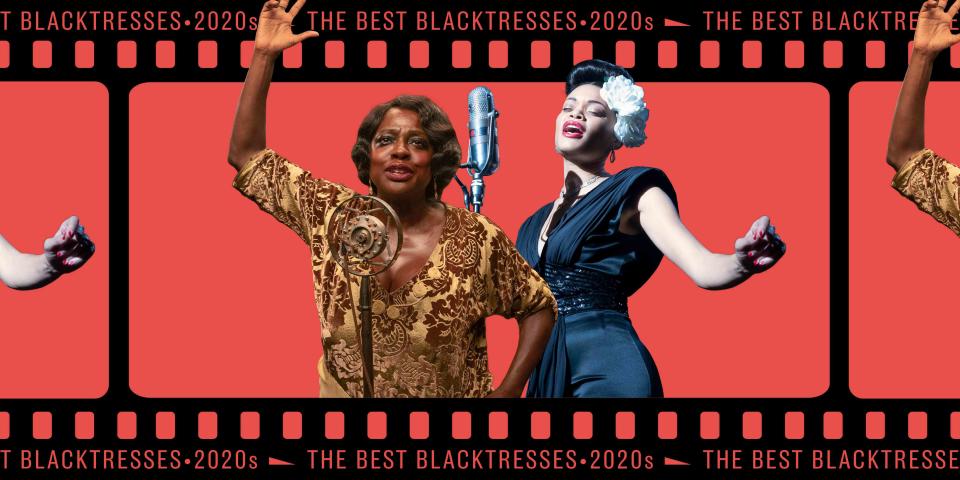
Everett Collection - Design: Alex Sandoval
Viola Davis and Andra DayThe Best Blacktresses is a weekly, seven-part series dedicated to the 13 Black women and their 14 performances (shout-out to two-time nominee Viola Davis) nominated for Best Actress in a Leading Role in the Academy Awards’ nearly 100-year history.
So far, this decade has been the most diverse in the history of the Academy Awards, not that the bar is very high. In 2021, Chloé Zhao became the second woman — and the first woman of color — to win Best Director; in 2023, Michelle Yeoh became the first Asian Best Actress winner; and, in 2024, Lily Gladstone became the first Native woman nominated for Best Actress. All in all, seven actors of color have won the 16 acting trophies given out since 2021. That’s nearly half, which has to be a sign of progress, right?
Yes and no. There's only been one year in the 2020s where Black women were nominated in the Best Actress category: 2021, when previous Lead Actress nominee and Supporting Actress winner Viola Davis squared off against newcomer Andra Day in her screen debut. Davis returned to the ever-flowing well of August Wilson — she had won two Tonys for Wilson plays and her Oscar for the film adaptation of his Fences — in Ma Rainey’s Black Bottom.
Directed by three-time Tony winner George C. Wolfe and adapted from the Wilson play by Ruben Santiago-Hudson, Ma Rainey’s Black Bottom follows a dramatic recording session over the course of one eventful day in 1920s Chicago. The film was Chadwick Boseman’s final performance — he died during post-production after a long, secret battle with colon cancer.
Boseman received some of the best notices of his career, making for an apt epitaph for a brief but brilliant career. And, as previously discussed, Viola Davis is Viola F---ing Davis. She put her whole foot in her portrayal of blues legend Ma Rainey and walked away with several accolades, including a Screen Actors Guild Award for Best Actress and becoming the first Black woman nominated twice for a Best Actress Oscar.
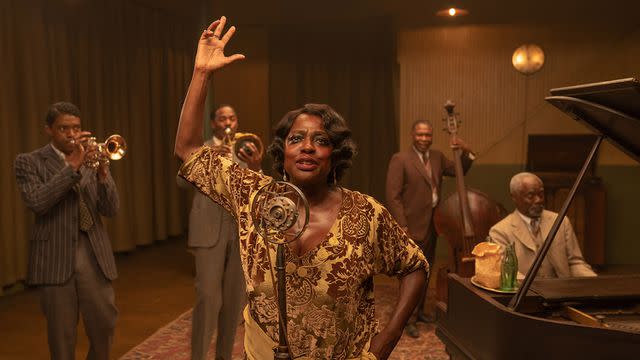
Born Dec. 30, 1984, in Edmonds, Wa., Andra Day grew up in San Diego and released her Grammy-nominated debut album Cheers to the Fall in 2015, featuring the hit “Rise Up.” For The United States vs. Billie Holliday, director Lee Daniels was hesitant to cast Day, owing to her limited acting experience. After meeting with her, he sent her to an acting coach, who, in turn, sent Daniels a short clip of Day getting into character. He was immediately sold.
“Just from that 30 seconds of video footage, I saw Billie Holiday without question,” Daniels told The Hollywood Reporter in 2021. “The game was up. There was no acting. There was just being.”
Daniels was enchanted by 1972’s Diana Ross-starring Lady Sings the Blues, as any gay Black boy would be. He sought, and obtained, the permission of Motown founder and the film’s producer Berry Gordy to make his own version of the Billie Holiday story. Adapted by Pulitzer Prize-winning playwright Suzan-Lori Parks from Johan Hari’s 2015 book about the war on drugs, Chasing the Scream, The United States vs. Billie Holiday depicted the government’s pursuit of Holiday over her seminal 1939 recording of “Strange Fruit,” in the guise of prosecuting her heroin use.
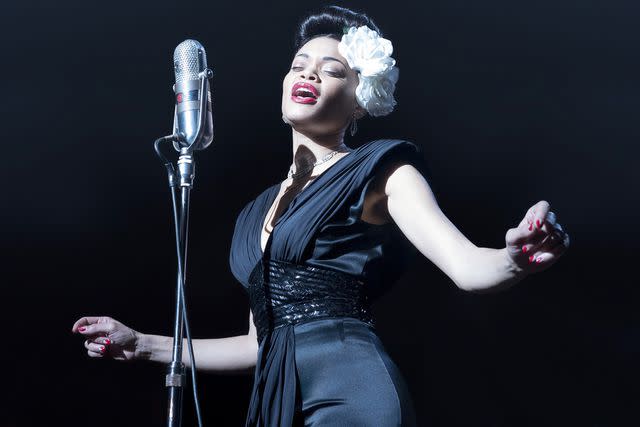
The film received mixed reviews, but Day’s performance was praised and she won the Golden Globe for Best Actress - Drama and was nominated, just as Ross had been, for Best Actress in a Leading Role at the Oscars.
The 2021 ceremony was remarkably similar to the 1973 one. Like Ross some 50 years before her, Day was a singer whose first film role was that of the legendary Billie Holiday. In 1973, Ross was up against Cicely Tyson in Sounder for Best Actress, marking the first time two Black women were in that same category. Just as Tyson’s costar Paul Winfield had been nominated for Best Actor, Davis’ Ma Rainey costar Boseman earned a posthumous Best Actor nomination.
But whereas Ross, Tyson, and Winfield were outliers at the 45th Academy Awards, Davis, Day and Boseman were part of a much larger wave of representation at the 93rd, with six other people of color nominated across acting categories. And very unlike the ‘73 Oscars, there were multiple people of color nominated for Best Director, Best Picture as producers, and in the Original and Adapted Screenplay categories. The 2021 Oscars felt like a truer reflection of the times we're living in — which is what Hollywood has always tasked itself with doing.
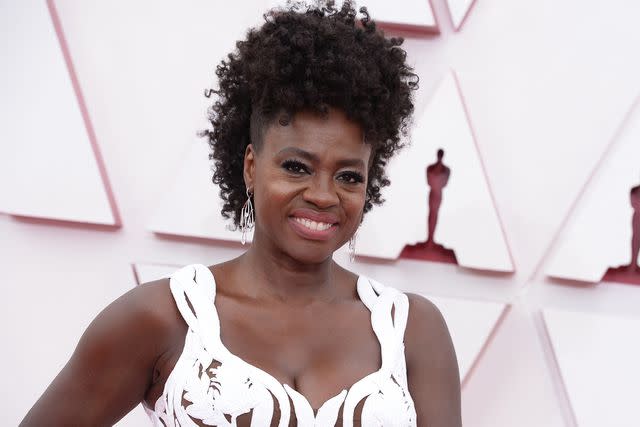
ABC via Getty
Viola Davis at the 2021 OscarsFor Best Actress, Davis and Day competed against Vanessa Kirby for Pieces of a Woman, Carey Mulligan for Promising Young Woman, and eventual winner Frances McDormand, winning her third Best Actress Oscar, for Nomadland (McDormand also shared the Best Picture award). Now, did Frances McDormand need a third Best Actress Oscar? Did she even need a second for Three Billboards Outside Ebbing, Missouri?
The answer to both is probably not, but her multiple wins — as well as Anthony Hopkins upsetting Boseman for Best Actor — highlight a perennial problem with the Oscars: esteemed actors being nominated and winning based, in part, on their esteem within a rather exclusive community. And those decisions almost always negatively impact actors of color, who are unlikely to be nominated multiple times for these awards and are often excluded from that community.
The year McDormand won for Three Billboards, she was up against Meryl Streep for The Post. The Post, y’all. A film best remembered for giving us Meryl in a series of increasingly stunning kaftans. Meryl Streep is divine, the greatest actor of her generation, etc., but she won her third Oscar for the schlockfest that was The Iron Lady, when there were at least half a dozen other performances of hers (in much better films) that better warranted that honor. And she beat out Viola Davis in The Help.
This isn’t to say that McDormand wasn’t great in Three Billboards, or Streep wasn’t fantastic in The Iron Lady, but was it their best work? And have the films held up? Especially when compared to their competition (or the lack thereof)? McDormand won for Three Billboards beating out Streep, yes, but also Saoirse Ronan for Lady Bird, Margot Robbie for I, Tonya, and Sally Hawkins for The Shape of Water — any of those three performances would’ve made for incredible and deserved wins, and the first for all the actresses involved. Still, they’re all white, have each received multiple nominations, and will most likely get their Oscar eventually. Black actresses, however, typically have one shot and it has to count.
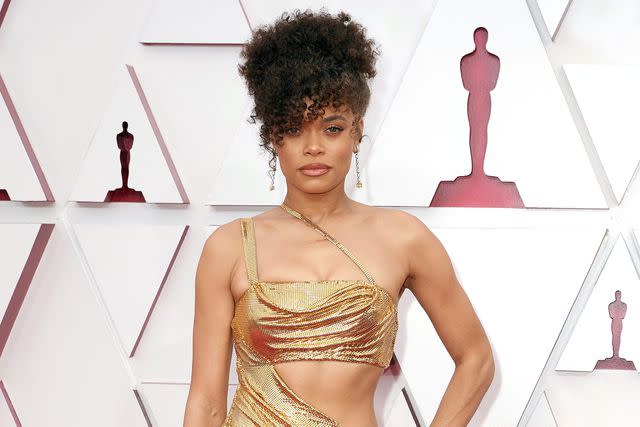
The Academy of Motion Picture Arts and Sciences began expanding and consciously diversifying its voting membership in 2016; of the 2023 class of new members, “40% identify as women, 34% belong to underrepresented ethnic/racial communities, and 52% are from 50 countries and territories outside the United States."
Perhaps more importantly, the Academy has also implemented representation and inclusion standards for Best Picture. For this year’s ceremony, in order for a film to have been eligible for consideration, it had to demonstrate diversity in at least two out of four standards: A. onscreen representation, themes, and narratives; B. creative leadership and project team; C. industry access and opportunities; and D. audience development.
The Academy is trying to promote representation in front of and behind the camera, but the guidelines have been criticized for not doing enough. By satisfying the bare minimum of two out of the four standards, such as hiring two interns and a senior marketing executive from underrepresented groups (women, LGBTQ+, people of color), studios can avoid the harder and more equitable efforts, like centering narratives on those underrepresented groups.
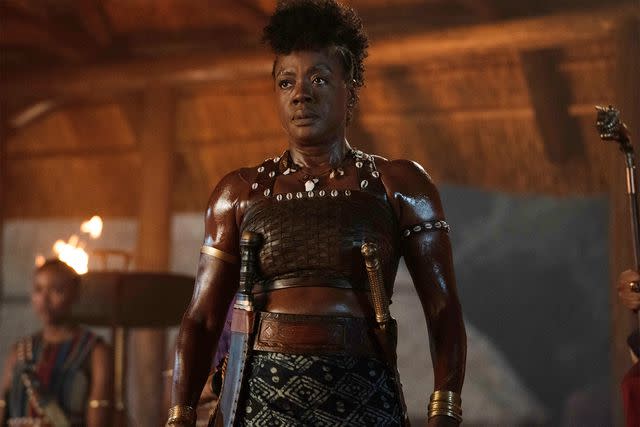
But even when those kinds of films are made, there’s no guarantee they’ll be recognized by AMPAS. The 2023 Academy Awards incited quite the controversy, particularly in the Best Actress category, when dark horse Andrea Riseborough secured a nomination in the 11th hour, after being largely ignored the entire awards season, for the indie film To Leslie.
The film’s director, Michael Morris, and his wife, Mary McCormack, started a celeb-filled publicity campaign with A-listers like Charlize Theron, Gwyneth Paltrow, Demi Moore, Jane Fonda, Laura Dern, Kate Winslet, Amy Adams, and Cate Blanchett voicing support for Riseborough, hosting screenings of To Leslie, and posting on social media. The Academy launched an investigation into the methods Riseborough and co. used in her Oscar campaign, eventually introducing new rules of conduct.
Davis had been nominated for all the top Best Actress awards for her performance in The Woman King, a landmark film in the history of Black women in cinema. Composed of a cast of majority Black women, and directed by a Black woman, Gina Prince-Bythewood, The Woman King garnered strong reviews and made nearly $100 million at the box office, against its $50 million budget. Davis, who also served as a producer, was singled out for her performance as General Nanisca, but when the time came for Oscar nominations, Davis was left out of the race.
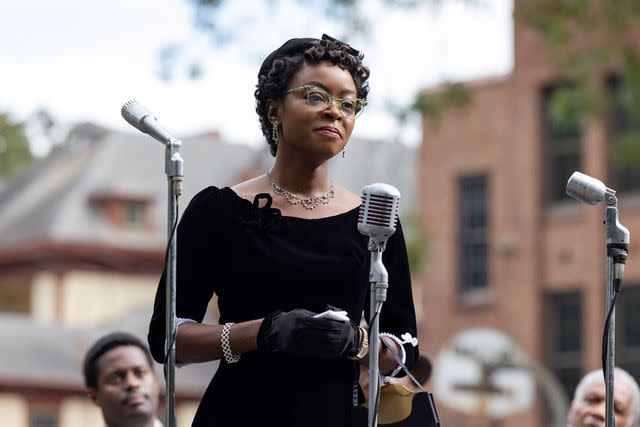
As was Danielle Deadwyler, whose performance in Till as Mamie Till, the mother of 11-year-old Emmett Till who was brutally murdered by a white mob in 1955, was universally acclaimed, nominated for multiple awards, and ultimately snubbed by the Academy. Till director Chinonye Chikwu, also a Black woman, criticized Till’s omission from the Oscars race as further example of the film industry’s commitment to “upholding whiteness and perpetuating an unabashed misogyny towards Black women.”
Deadwyler questioned if Academy voters even bothered to see the film — a good point, considering the enthusiasm for a movie like To Leslie, about a white woman seeking redemption, and the difficult conversation raised by a film like Till, which grapples with one of the ugliest moments in modern American history.
"We're talking about people who perhaps chose not to see the film," she said at the time, referring to AMPAS voters. "We're talking about misogynoir, like it comes in all kinds of ways, whether it's direct or indirect. It impacts who we are. I think the question is more on people who are living in whiteness, white people's assessment of the spaces they are privileged by."
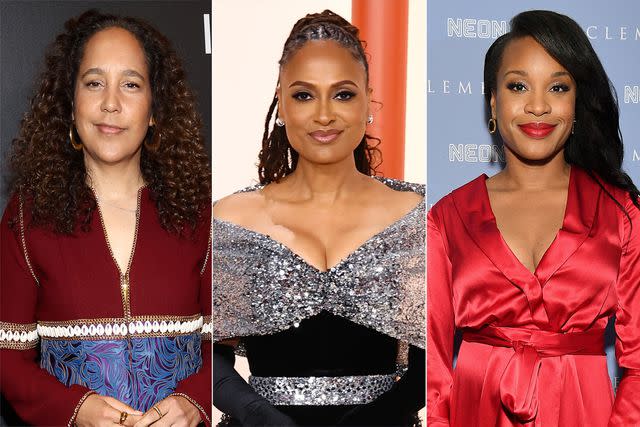
Tommaso Boddi/Getty; Arturo Holmes/Getty; Dia Dipasupil/Getty
Gina Prince-Bythewood, Ava Duvernay, and Chinonye ChukwuPrince-Bythewood took aim, indirectly, at Riseborough and the network of powerful celebs riding in support of her, writing in an op-ed for THR:
My issue with what happened is how people in the industry use their social capital — screenings in their homes, personal calls, personal emails, personal connections, elevated status. People like to say, “Well, Viola and Danielle had studios behind them.” But we just very clearly saw that social capital is more valuable than that. That type of power is exercised in more casual ways in social circles, where folks are your friends or your acquaintances. There may be diversity on your sets but not in your lives. And Black women in this industry, we don’t have that power. There is no groundswell from privileged people with enormous social capital to get behind Black women. There never has been.
Even when there is, it doesn’t have the same impact. Ava Duvernay wrote, directed, and co-produced last year’s Origin as a labor of love. Funded outside of the studio system with private investors, Duvernay’s adaptation of Isabel Wilkerson’s 2020 nonfiction bestseller Caste received limited release but widespread acclaim. Without a major studio to back the film, Duvernay and the film’s cast got the word out on their own.
Leading lady Aunjanue Ellis-Taylor (a Best Supporting Actress nominee for 2022’s King Richard) was spotted handing out postcards about Origin in front of a Los Angeles movie theater. Celebs like Ben Affleck, Sean Penn, Angelina Jolie, Dave Chappelle, and Lin-Manuel Miranda hosted screenings of the film. But, aside from a Best Actress Gotham Award nomination for Ellis-Taylor and a Golden Lion nomination at the Venice Film Festival, Origin failed to gain much attention.
“This film does something that is very, very brave,” Ellis-Taylor told PEOPLE in January. “I think it is brave creatively, I think it is brave in its message, I think it confronts things in a way that is innovative. And I just think that we [in Hollywood] award the white guys for that kind of work.”
At its roots, the Oscars are a trade award created as a publicity stunt by a nascent film industry, but in their near-100 years in existence, they’ve grown to represent the pinnacle of a transformative art form. Black people have had to fight their way to get into Hollywood and to be recognized by the Academy, but for their efforts, the work remains — even if the wins never came.
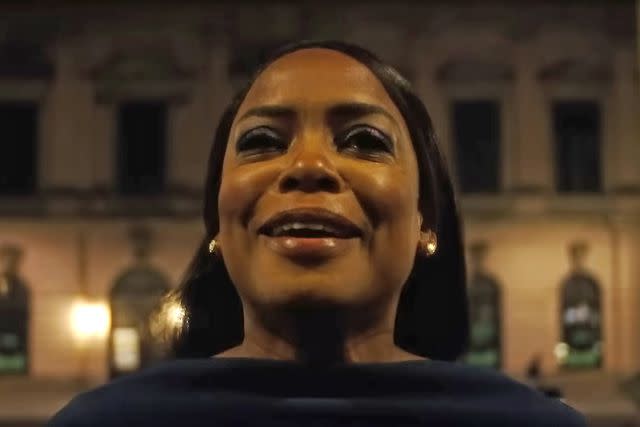
We have layered, complex portraits of Mamie Till, Billie Holiday, and Ma Rainey; we have brilliant performances that have changed the face of acting, literally and figuratively; we have films that would or could never have been made 10, 15, 20 years ago. It would be nice if the Oscars got its s--- together and gave more than one woman of color a Best Actress Oscar every two decades, but films shouldn’t be made for awards. They should be made to tell a story, to share a truth, to humanize those whose humanity is often neglected or denied.
In that respect, Dorothy Dandridge, Diana Ross, Cicely Tyson, Diahanne Carroll, Whoopi Goldberg, Angela Bassett, Halle Berry, Gabourey Sidibe, Viola Davis, Quvenzhané Wallis, Ruth Negga, Cynthia Erivo, Andra Day, and so many others have more than excelled — they have triumphed. The history of cinema has been made infinitely better by these noble Blacktresses and no Oscar could possibly beat that.
Want more movie news? Sign up for Entertainment Weekly's free newsletter to get the latest trailers, celebrity interviews, film reviews, and more.
Related content:
The Best Blacktresses - 1970s: Diana Ross, Cicely Tyson, and Diahann Carroll
The Best Blacktresses - 2000s: Halle Berry and Gabourey Sidibe
The Best Blacktresses - 2010s: Viola Davis, Quvenzhané Wallis, Ruth Negga, and Cynthia Erivo
Read the original article on Entertainment Weekly.
